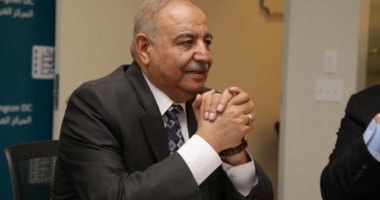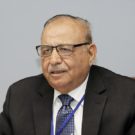
Speaker
Moderator
Event Summary
Arab Center Washington DC (ACW) hosted a Luncheon for Dr. Abdulwahhab Al-Qassab; on 8 October 2015 titled “Russian Intervention in Syria: Motives and Challenges.” Chaired by ACW Executive Director Khalil Jahshan; the event brought together Middle East experts and media representatives from around the Washington DC area.
Dr. Abdulwahab Al-Qassab, Associate Researcher at the Arab Center for Research and Policy Studies in Doha, Qatar discussed the three main motives for Russia’s military intervention in Syria. The first, and most important factor, according to Dr. Al-Qassab, is the failure by Iran and Hizbollah to deal with the gains achieved by the Syrian resistance in several regions across Syria, including Aleppo, Idlib, Hama and Deraa. This failure, from Moscow’s perspective, began to threaten Russia’s fundamental interests in Syria.
The second factor is Russia’s need for demonstration of power, signaling to the US, Arab countries, Turkey and Iran, that Russia is capable and willing of unilateral action to defend its vital interests in the region. The Russian move, without any coordination with entities already fighting ISIS in Syria and Iraq, is also intended to re-establish itself as the second major international power and reassure public opinion inside Russia.
The third motive of Russian military involvement in Syria is Russia’s desire to protect its interests throughout the Eastern Mediterranean. In terms of geo-strategic interests, Syria is the only remaining option for Russia to maintain its naval facilities in the regions and continue the use of warm waters ports in Latakia and Tartus for both geopolitical and economic advantages. In addition, the recent discovery of oil and gas resources in the Eastern Mediterranean highlights Russian involvement even further. Al-Qassab emphasized that Syria is clearly an asset which Russia is not ready to compromise.
While Russia justifies its expanded military role in Syria as based mostly on its intention to fight ISIS, Dr. Al-Qassab noted that its attack on Hama, where no ISIS presence is reported and where the Free Syrian Army is positioned, is a clear indicator of Russia’s real intentions. He also noted that Russian support for the Syrian regime is not only manifested through the recent military intervention, but has been prominent through a series of Russian votes at the UN Security Council.
In terms of consequences, Dr. Al-Qassab maintained that it was premature to predict precise outcomes of the Russian intervention in Syria, but he did mention the potential backlash from ISIS and other Islamist groups against Russia, the humanitarian consequences for the Syrian people through further mass destruction of Syrian cities, and the potentially significant economic burden on an exhausted Russian economy. He concluded that this move presents one of the most important decisions taken by Putin, as it will define the future role of Russia and Iran in the region, including Russia’s ability to assume the role of mediator in the Syrian conflict.


